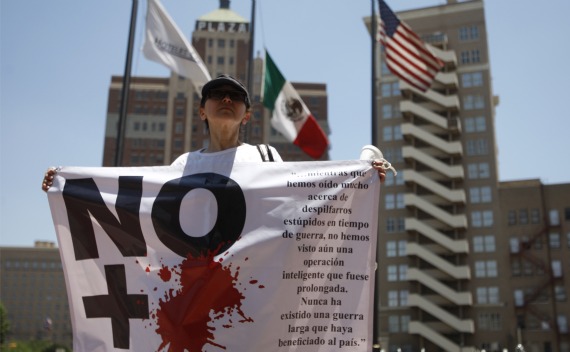Evolving Views on Mexico’s War on Drugs
More on:

The U.S.-Mexico Interparliamentary Group convened in DC a couple of weeks ago, an annual meeting of senators and deputies from both sides of the border. Mexican political heavyweights, including Manlio Fabio Beltrones and Francisco Rojas of the PRI, José González Morfín and Josefina Vázquez Mota of the PAN, and Carlos Navarrete and Armando Ríos Piter of the PRD attended, matched on the U.S. side by Senators Tom Udall (D-NM), Kay Bailey Hutchison (R-TX), Bob Menendez (D-NJ), and Representative Connie Mack (R-FL) among others. While topics ranged from immigration to border issues, the main concern for all was security.
Even as the politicians talked of mutual trust and cooperation, Mexico’s fight against drug traffickers is being increasingly questioned on both sides of the border. In Mexico, several politicians – mostly from the PRI– have denounced Calderón’s approach. They dispute the focus of the government’s war, criticize its constitutionality, and challenge the recent track record on impunity, corruption, and economic opportunity.
Independent columnists and analysts too are increasingly vocal. For instance, Eduardo Guerrero of Lantia Consultores argues for a revised focus on crime rather than drugs. He calls for a new strategic framework that targets the most egregious violence and uses force largely to contain groups and erode their structures over time — an anti-crime strategy used in the United States. Ordinary citizens in Mexico have begun to agitate against the government’s strategy – most vocally those following Javier Sicilia, a poet who took on the anti-violence cause after his son and friends were executed by cartel thugs last year. He first led thousands of Mexicans in a march of silence from Cuernavaca to Mexico City, then marched north to the border and violence-stricken Ciudad Juárez. Last week he and others from his group met with President Calderón, who apologized for not having done enough to protect the innocent, but also vowed to continue fighting organized crime.
In many ways the rising criticism is to be expected. Violence has escalated in the last few years, and spread (though is still concentrated in some 10 percent of Mexico’s municipalities). It has also hit average Mexicans more – as organized criminals expand their operations from running drugs into kidnapping, robbery, extortion, and the like. Mexico now is second only to Venezuela in the number of kidnappings in the world – and has over three times as many kidnappings per 100,000 inhabitants as Colombia did during its most violent period. In short, the current strategy has not made the average citizen feel safer on a day to day basis. These critiques also reflect the electoral calendar. Mexico is beginning the ramp up to the 2012 Presidential election, and security is, according to most polls, the number one issue. It is also the issue on which the President has staked his administration, and to which he returns in the vast majority of his speeches and appearances.
What may be a bit more surprising is the escalating critiques to the north, and of the U.S. role in combating this insecurity. Two recent Congressional reports lambast the handling of guns flowing south, while another questions the nature and accountability of counternarcotics spending more generally. Recent testimonies by Alan Bersin and Charles Edwards before the Senate Homeland Security and Governmental Affairs Committee reveal worries about spreading corruption on the northern side of the border, while others debate the extent (and even reality) of “spillover violence.”
Viewed as a whole, the increasing political skepticism (combined with pressures to cut budgets in the U.S. congress) bodes a much heavier lift for continued and deepening cooperation. As both countries go into Presidential elections, these critiques will likely only increase. Much of this questioning is important. All these policies will have long term ramifications for both Mexico and the United States, and as such should be analyzed and debated. But the trick will be to keep these necessary discussions from derailing the relationship and eroding the trust that the two countries built over the past four years, taking us all back to square one.
More on:
 Online Store
Online Store